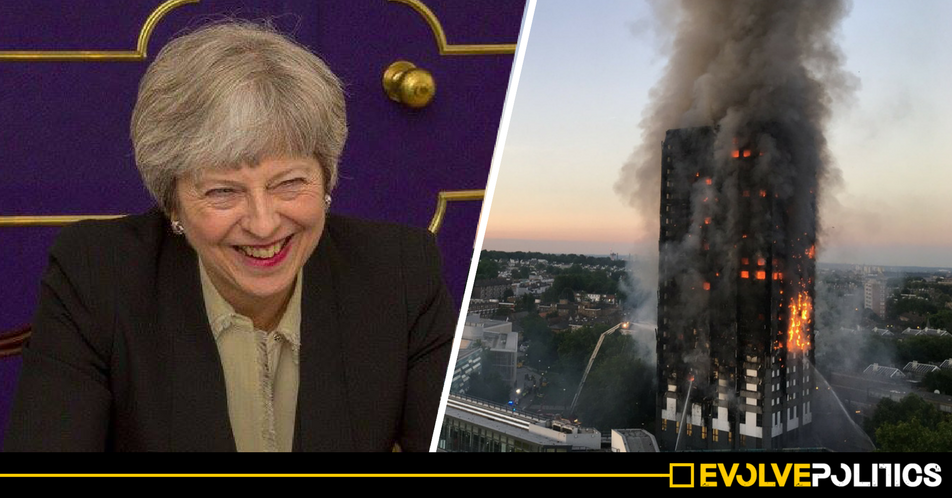After reportedly bowing to heavy lobbying from construction firms, Theresa May’s Conservative government are poised to severely weaken fire regulations for high-rise buildings, despite numerous promises from the government to improve fire safety following the horrific Grenfell fire which claimed the lives of 71 people last June.
It is understood that the government intends to revise regulations to allow construction firms to merely carry out ‘desktop studies’ on combustible insulation, rather than forcing firms to carry out the large scale tests that are currently demanded for all potentially combustible building materials to be used in the insulation of high rises.
Desktop studies are essentially computer simulations that do not involve real-life tests, and would amount to a far cheaper, far-less rigorous method for testing combustible construction materials that would allow firms to save vast amounts of time and money.
Peter Apps, the News Editor for Inside Housing, posted a 10-tweet thread explaining the worrying situation in detail, and accused the government of seeking to ‘quietly weaken the restrictions on putting combustible materials on high rises following lobbying from the insulation industry.’
Apps begins his detailed explanation of exactly how the government are trying to sneak out by saying:
Building regulations ONLY permit combustible insulation if it passes a large scale fire safety test known to nerds like me as BS-8414
These tests are expensive and time consuming. In 2014 the industry just came up with a way of doing less of them: desktop studies.
These involve looking at previous test data and making essentially an informed guess about whether or not the cladding system is safe. It has NEVER been part of the official guidance.
At least one system cleared through a desktop study has been proved UNSAFE by an official test. The LGA, and others, argue the process is flawed and should be dropped.
But the government, following lobbying from the plastic insulation industry, is going to alter building regulations to officially approve their use
Apps goes on to conclude the thread by stating that:
The other options on the table are:
– Ban combustible materials from use on high rises full stop
– Continue the present, official, system which says effectively in the rare cases they are used they must be fully tested
I don’t think anyone expected building regulations to get LESS tough on combustibles post-Grenfell. But that’s about to happen. If you have an opinion on this, now is the opportune time to express it (ends)
Following the thread, questions arose about the validity of Apps’ claims, with one Twitter user stating that:
I’m no fan of this government but I’m somehow having a hard time imagining them to be dumb enough to propose something like this in the wake of Grenfell and somehow think they’d get away with it “quietly”.
To which Apps clarified that:
The current Approved Document B has no provision for desktop studies, and demands limited combustibility or testing. Any introduction of a desktop studies route into the official guidance represents a weakening of this position.
And in an article edited by Mr Apps on the Inside Housing website, the publication quotes a Ministry of Housing, Communities and Local Government source who reportedly told them that the government “intended to “revise the wording” of desktop studies in Approved Document B”, with the article going on to state that:
it is not clear what it means by this as there is currently no mention of desktop studies in the guidance…
Were this to permit their use for combustible materials, it would represent a significant weakening of official restrictions on the use of combustible material on high-rise buildings.
The Hackitt Report – an Independent Review of Building Regulations and Fire Safety – recommended the government should “significantly restrict” the use of desktop studies.
However, Inside Housing reports that the giant insulation firm Kingspan has been following a “strategy” to “support the use of desktop studies”, and that “in its (Kingspan’s) submission to the Hackitt Review, it called for desktop studies to be retained but with reforms such as a standard methodology.”
Evolve Politics have contacted the Ministry of Housing, Communities and Local Government for comment on the deeply worrying proposals. At the time of publishing they had not yet replied to our request.
Become An Evolve Politics Subscriber
Your subscriptions go directly into paying our writers a standard fee for every article they produce. So if you want to help us stay truly independent, please think about subscribing. We literally couldn’t function without the support of our fantastic readers.
SubscribeOr a One-Off Donation to Evolve Politics
If you don’t want to subscribe, but still want to contribute to our project, you can make a one-off donation via the donate button below. All your donations go directly to our writers for their work in exposing injustice, inequality and unfairness.
Donate
